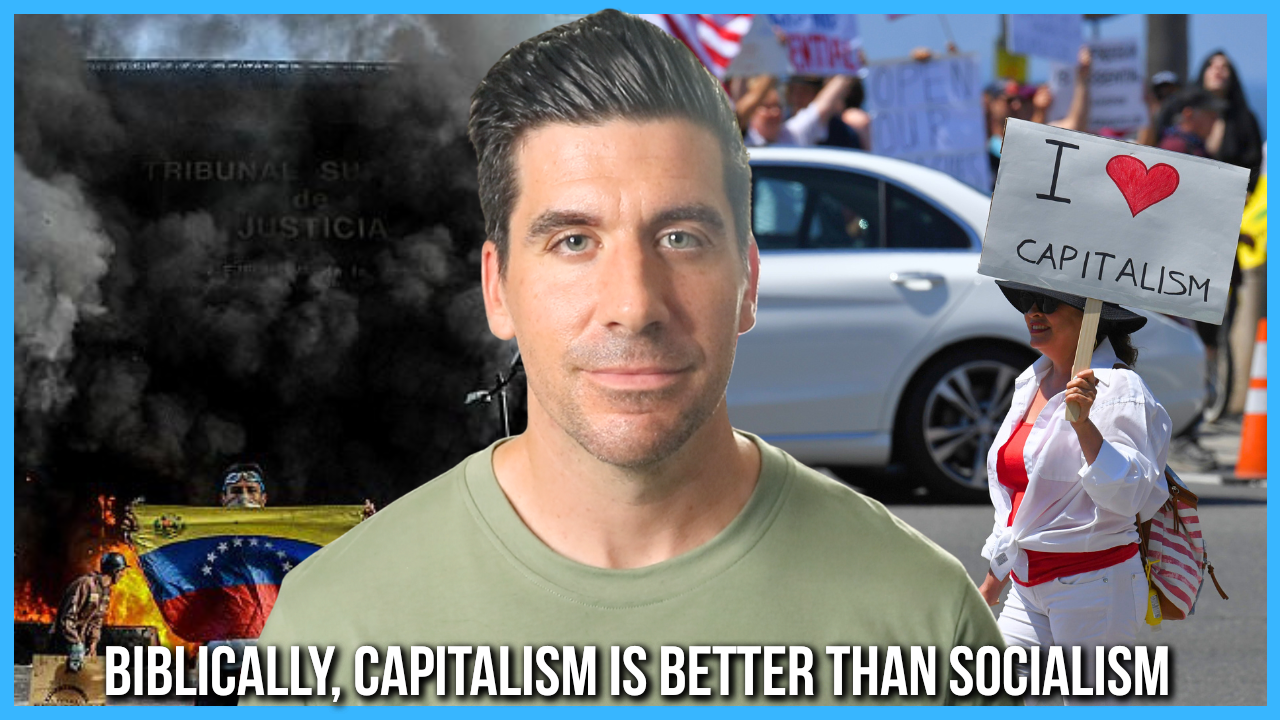
Was Jesus a socialist? Didn’t he promote giving your wealth to those in need? Isn’t capitalism mean because it always has winners and losers? Isn’t socialism more biblical because it helps everyone win?
Last week, I posted an article titled The Biblical Reason a Bigger Government Is Bad. In that article, I discussed the principle that true good cannot be forced. That is one reason Jesus was not a socialist. Everything Jesus commanded was a choice. He never called his disciples to force other people to give their resources away. Rather, Scripture says true generosity that pleases God must be done from a cheerful heart, not a forced coercion (2 Corinthians 9:7).
You should check out that article for more on those concepts. Today, however, I want to not only give you reasons why a smaller government is more biblical than a bigger government. But I also want to give you three biblical reasons capitalism is better than socialism.
1. The Bible Says the Worker Deserves His Wages; Thus, Capitalism Is Better than Socialism
“For the Scripture says, ‘You shall not muzzle an ox when it treads out the grain,’ and, ‘The laborer deserves his wages.’” (1 Timothy 5:18)
The Bible consistently affirms that people deserve to reap the fruit of their labor. God created work as good (Genesis 2:15), and he blesses diligence and productivity (Proverbs 14:23). Systems that emphasize personal responsibility and reward for hard work reflect this biblical reality.
Capitalism, though imperfect, aligns more closely with the biblical principle that workers deserve their wages. It encourages people to use their gifts, take risks, and pursue excellence. Socialism, on the other hand, often fosters entitlement by rewarding people regardless of their effort. Over time, this discourages initiative and punishes diligence.
A smaller government that limits excessive redistribution allows workers to keep what they earn, empowering them to provide for their families, help others, and exercise stewardship. Paul commands believers in 2 Thessalonians 3:10, “If anyone is not willing to work, let him not eat.” In God’s economy, reward should be tied to responsibility, not to entitlement.
Work is like planting seeds. A farmer sows, waters, and waits, expecting to harvest what he planted. If the government steps in and takes half of his crop to give to others who never sowed, the farmer loses motivation to plant at all. Eventually, the entire field lies barren. Smaller government ensures that those who sow can also reap.
2. The Bible Says the Human Heart Is Wicked Without Christ; Thus, Capitalism Is Better than Socialism
“The heart is deceitful above all things, and desperately sick; who can understand it?” (Jeremiah 17:9)
One of the clearest biblical truths about humanity is that our hearts are corrupt apart from Christ. When too much power is concentrated in the hands of a few, corruption multiplies. Tyranny grows in the fertile soil of unchecked authority.
This is why the American founders, influenced by biblical principles, built a government with checks and balances. They recognized what Scripture affirms: people are prone to sin, selfishness, and corruption. A smaller government disperses power among individuals, families, churches, and businesses. It creates a system where good ideas can flourish through voluntary cooperation, rather than being enforced by a corruptible elite.
When people place blind trust in big government, they forget the reality of human depravity. History proves this truth again and again: when leaders gain unchecked control, oppression always follows. A smaller government acknowledges our sinful nature and protects against concentrated corruption. The more individual freedom a society has, the more protected it is from a government of tyranny.
3. The Bible Promotes Personal Responsibility, Thus Capitalism Is Better than Socialism
“For each will have to bear his own load.” (Galatians 6:5)
God calls every person to take responsibility for their own lives. While we are commanded to help bear one another’s burdens (Galatians 6:2), Scripture also affirms that ultimately each person must carry his or her own load. A society that expects government to provide everything undermines this principle of responsibility.
The more we expect from others, the less we expect from ourselves. When government steps in to provide for every need, individuals often lose the incentive to work, to problem-solve, and to steward their own resources wisely. Work is a gift from God, not a curse (Genesis 2:15). Ecclesiastes 3:13, “. . . that everyone should eat and drink and take pleasure in all his toil—this is God’s gift to man.
When we give resources rather than give opportunities to earn resources, we rob people of the blessing that comes through work. Smaller government helps preserve the biblical balance: compassion and aid for those truly in need, but accountability for those able to work and contribute but who simply refuse.
Jesus himself illustrated this principle in the Parable of the Talents (Matthew 25:14-30). Each servant was given resources and expected to use them responsibly. The servant who buried his talent and did nothing was condemned. God values initiative, stewardship, and accountability.
The Bible paints a picture of a society where people are free to choose good, where workers are rewarded for their labor, where sin’s corruption is restrained by government officials, and where individuals take responsibility for their own lives.
Big government often works against these principles by coercing generosity, redistributing wages unjustly, centralizing power into the hands of the corrupt, and fostering dependence rather than responsibility.
